|
|
|
Sort Order |
|
|
|
Items / Page
|
|
|
|
|
|
|
| Srl | Item |
| 1 |
ID:
170399
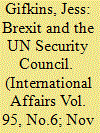

|
|
|
|
|
| Summary/Abstract |
The United Kingdom's decision to leave the European Union has ramifications beyond the UK and the EU. This article analyses the impact of the Brexit referendum on the UK's political capital in the United Nations Security Council; a dimension of Brexit that has received little attention thus far. Drawing on extensive elite interviews we show that the UK has considerable political capital in the Council, where it is seen as one of the most effective actors, but the reputational costs of Brexit are tarnishing this image. With case-studies on the UK's role in Somalia and Yemen we show how the UK has been able to further its interests with dual roles in the EU and Security Council, and the risks posed by tensions between trade and human rights after Brexit. We also analyse what it takes to be influential within the Security Council and argue that more attention should be paid to the practices of diplomacy. Influence is gained via penholding, strong diplomatic skill and a well-regarded UN permanent representative. The UK accrues political capital as a leader on the humanitarian and human rights side of the Council's agenda, but this reputation is at risk as it exits the EU.
|
|
|
|
|
|
|
|
|
|
|
|
|
|
|
|
| 2 |
ID:
170400
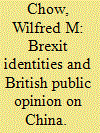

|
|
|
|
|
| Summary/Abstract |
Many studies have explored the importance of public opinion in British foreign policy decision-making, especially when it comes to the UK's relations with the United States and the European Union. Despite its importance, there is a dearth of research on public opinion about British foreign policy towards other major players in the international system, such as emerging powers like China. We have addressed this knowledge gap by conducting a public opinion survey in the UK after the Brexit referendum. Our research findings indicate that the British public at large finds China's rise disconcerting, but is also pragmatic in its understanding of how the ensuing bilateral relations should be managed. More importantly, our results show that views on China are clearly split between the two opposing Brexit identities. Those who subscribe strongly to the Leave identity, measured by their aversion to the EU and antipathy towards immigration, are also more likely to hold negative perceptions of Chinese global leadership and be more suspicious of China as a military threat. In contrast, those who espouse a Remain identity—that is, believe that Britain would be better served within the EU and with more immigrants—are more likely to prefer closer engagement with China and to have a more positive outlook overall on China's place within the global community.
|
|
|
|
|
|
|
|
|
|
|
|
|
|
|
|
| 3 |
ID:
170401
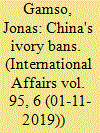

|
|
|
|
|
| Summary/Abstract |
China has been a major market for elephant ivory for centuries. However, the Chinese government recently enacted bans on imports and exports of ivory (2015) and on the domestic ivory trade (2017). These bans appear to have come in response to intensive influence campaigns and public shaming from domestic and foreign activists, who cited declining elephant populations and highlighted China's role. However, this shaming-narrative is at odds with conventional wisdom regarding Chinese policy-making: China typically resists international pressures and its authoritarian government is thought to be largely insulated from domestic efforts by civil society groups. This article reconciles Beijing's ivory policy with these conventional beliefs about policy-making in China. I argue that the Chinese government saw unique benefits to banning the ivory trade, under growing international scrutiny, as doing so enhanced Chinese soft power while having very little impact on its sovereignty or development. Non-government organizations (NGOs) operating both inside and outside of China played a role as well: NGOs in China helped to shift Chinese public opinion towards favouring the bans, while those operating abroad led public relations efforts to publicize Chinese demand for ivory to foreign audiences. Efforts by the latter group of NGOs intensified pressure on the Chinese government to rein in the ivory market, while increasing the soft power benefits that banning ivory would bring to Beijing.
|
|
|
|
|
|
|
|
|
|
|
|
|
|
|
|
| 4 |
ID:
170392


|
|
|
|
|
| Summary/Abstract |
Marysia Zalewski's work has taught us, as a collective of feminist scholars, to be cautious of neat instruction manuals and coherently set out plans of action; of claims to sure knowledge about danger, violence, and its subjects and remedies; of the fanfare of grand arrivals; and of the quieter staking of ground that has been seemingly won. Zalewski has persistently reminded us in different ways that we/she does ‘not even know what gender is or does’. Far from a flippant response to the emptiness of gender mainstreaming policies, this seemingly simple statement instead serves as a glaring post-it note on the margins of our texts about International Relations theory, feminism, sex/gender and violence— both those that we read, as well as those that we write. However, this lesson is often forgotten in our rush to understand and establish gendered harms as valid and important, and to seek their redress. Gleaning insights from Zalewski's work, this article critically considers possible responses to the 2018 Nobel Peace Prize. Its aim is not to delve into a discussion of the politics or effects of the Peace Prize as such, but to instead use the 2018 Peace Prize as a marker—a moment to consider the possibility for critique in relation to sexual violence.
|
|
|
|
|
|
|
|
|
|
|
|
|
|
|
|
| 5 |
ID:
170403
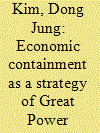

|
|
|
|
|
| Summary/Abstract |
Economic containment has garnered repeated attention in the discourse about the United States' response to China. Yet, the attributes of economic containment as a distinct strategy of Great Power competition remain unclear. Moreover, the conditions under which a leading power can employ economic containment against a challenging power remain theoretically unelaborated. This article first suggests that economic containment refers to the use of economic policies to weaken the targeted state's material capacity to start military aggression, rather than to influence the competitor's behaviour over a specific issue. Then, this article suggests that economic containment becomes a viable option when the leading power has the ability to inflict more losses on the challenging power through economic restrictions, and this ability is largely determined by the availability of alternative economic partners. When the leading power cannot effectively inflict more losses on the challenging power due to the presence of alternative economic partners, it is better off avoiding economic containment. The author substantiates these arguments through case-studies of the United States' responses to the Soviet Union during the Cold War. The article concludes by examining the nature of the United States' recent economic restrictions against China.
|
|
|
|
|
|
|
|
|
|
|
|
|
|
|
|
| 6 |
ID:
170391
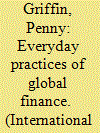

|
|
|
|
|
| Summary/Abstract |
This article argues that practices of global finance provide a rich opportunity to consider gender's embodiment in everyday, but highly regulatory, financial life. Tracing a pathway through the rise of the ‘diversity agenda’ in global finance in the wake of the global financial crisis, the article asks how ‘diversity’ has shaped the global financial services industry, and whether it has challenged the reproduction of gendered power in global finance. Recent, innovative feminist political economy work has laid out a clear challenge to researchers of the global political economy to explore how everyday practices have become significant sites of gendered, regulatory power, and this article takes up this challenge, analysing how the rise of ‘diversity’ in financial services reveals the crucial intersections of gendered power and everyday economic practices. Using a conceptual framework drawn explicitly from Marysia Zalewski's work, this article advances critical inquiry into how gender has become an often unacknowledged way of writing the world of global finance, in ongoing, and problematic, ways. It proposes that the practices and futures of the diversity agenda in global finance provide a window into the persistent failure of global finance to reconfigure its foundational masculinism, and asks that financial actors begin to take seriously the foundational, gendered myths on which global finance has been built.
|
|
|
|
|
|
|
|
|
|
|
|
|
|
|
|
| 7 |
ID:
170393
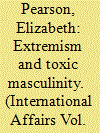

|
|
|
|
|
| Summary/Abstract |
It is more than 20 years since Marysia Zalewski and feminist scholars posed ‘the man question’ in International Relations, repositioning the gaze from female subjectivities to a problematization of the subjecthood of man. The field of masculinity studies has developed this initial question to a deep interrogation of the relationship between maleness and violence. Yet public and policy discourse often reduce the complexity of masculinities within extremism to issues of crisis and toxicity. Governments have prioritized the prevention of extremism, particularly violent Islamism, and in so doing have produced as ‘risk’ particular racialized and marginalized men. This article asks, what are the effects of the toxic masculinity discourse in understanding the British radical right? It argues that current understandings of extremism neglect the central aim of Zalewski's ‘man’ question to destabilize the field and deconstruct patriarchy. They instead position Islamophobia—which is institutionalized in state discourse—as the responsibility of particular ‘extreme’ and ‘toxic’ groups. In particular, the article outlines two ways in which ‘toxic masculinity’ is an inadequate concept to describe activism in the anti-Islam(ist) movement the English Defence League (EDL). First, the term ‘toxic masculinity’ occludes the continuities of EDL masculinities with wider patriarchal norms; second, it neglects the role of women as significant actors in the movement. Using an ethnographic and empathetic approach to this case-study, the article explores how Zalewski's theoretical position offers a route to analysis of the ways in which masculinities and patriarchy entwine in producing power and violence; and to a discussion of masculinities that need not equate manhood with threat.
|
|
|
|
|
|
|
|
|
|
|
|
|
|
|
|
| 8 |
ID:
170395


|
|
|
|
|
| Summary/Abstract |
Feminist interventions in international politics are, more often than not, understood (and visible) as interventions in relation to policy documents. These policies—in this case the United Nations Security Council's resolutions on Women, Peace and Security—often feature as the end point of feminist advocacy efforts or as the starting point for feminist analysis and critique. In this article the author responds to the provocations throughout Marysia Zalewski's work to think (and tell) the spaces of international politics differently, in this case by working with the concept of feminist failure as it is produced in feminist policy critique. Inspired by Zalewski's Feminist International Relations: exquisite corpse, the article explores the material and imaginary spaces in which both policies and critique are produced. It picks up and reflects upon a narrative refrain recognizable in feminist critiques on Women, Peace and Security policy—that we must not make war safe for women—as a way to reflect on the inevitability of failure and the ostensible boundaries between theory and practice. The author takes permission from Zalewski's creative interventions and her recognition of the value of the ‘detritus of the everyday’—here a walk from New York's Grand Central Station to the UN Headquarters, musings on the flash of a particular shade of blue, and the contents of a footnoted acknowledgement, begin to trace an international political space that is produced through embodied and quotidian practice.
|
|
|
|
|
|
|
|
|
|
|
|
|
|
|
|
| 9 |
ID:
170398
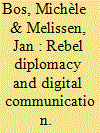

|
|
|
|
|
| Summary/Abstract |
Most research on social media as a tool for public diplomacy focuses on its use by recognized international actors to advance their national interest and reputation, deliver foreign policy objectives or promote their global interests. This article highlights the need for paying more attention to non-state diplomacy in conflict situations outside the western world. We examine how rebel groups use new media to enhance their communications, and what the motivations behind this are. Our public diplomacy perspective helps convey the scope of rebel communications with external actors and provides insights for policy-makers seeking to ascertain the nature, intentions and capacities of myriad rebel groups. Our focus is on the Sahel region, where numerous such groups vying for international attention and support make use of multiple social media channels. We analyse two groups in Mali: the MNLA, a Tuareg secessionist group; and Ansar Dine, a Salafist insurgency with ties to Al-Qaeda in the Islamic Maghreb. Our qualitative analysis of Ansar Dine and MNLA communications on several digital platforms helps identify these African rebel groups' international and local framing activities. Rebel groups use public diplomacy nimbly and pragmatically. The digital age has fundamentally changed which stakeholders such groups can reach, and we suggest that social media increase the power they are able to carve out for themselves on the international stage.
|
|
|
|
|
|
|
|
|
|
|
|
|
|
|
|
| 10 |
ID:
170396


|
|
|
| 11 |
ID:
170397
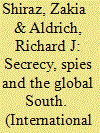

|
|
|
|
|
| Summary/Abstract |
The study of secrecy and spies remain subjects dominated by Anglo-American experiences. In recent years there has been some effort to refocus the lens of research upon ‘intelligence elsewhere’, including the global South. This is partly because of intense interest in the Arab Spring and ‘managed democracy’, placing a wider range of secret services under the spotlight. However, the approach to research is still dominated by concepts and methods derived from studying the English-speaking states of the ‘Five Eyes’ alliance and their European outriders. This article calls for a re-examination of research strategies for Intelligence Studies and for those theorizing surveillance, suggesting that both fields have much to learn from area studies and development studies, especially in the realm of research practice and ethics. If the growing number of academics specializing in intelligence genuinely wish to move forward and examine the global South they will need to rethink their tool-kit and learn from other disciplines. We suggest there is a rich tradition to draw upon.
|
|
|
|
|
|
|
|
|
|
|
|
|
|
|
|
| 12 |
ID:
170402


|
|
|
|
|
| Summary/Abstract |
The proposed creation of a US Space Force has led to a ratcheting up of a sense of competition and threat among spacefaring powers. Many top government officials and experts around the world believe that space will inevitably become the next battlefield, either among countries, or private companies, or both. India successfully blew up a satellite, China landed a probe on the dark side of the moon and many other countries have rapidly developed launch capabilities. The term ‘Space Race 2.0’ is increasingly invoked. But are we in the midst of a new space race, or on the verge of a new space age? This article argues that despite many governmental efforts to militarize space over the past 70 years, on the whole, non-state actors have ensured that space has been a highly cooperative realm of human interaction, even during the height of the Cold War. While on the surface there has been a narrative of threat-based competition, the author argues that this has largely been socially constructed. Drawing upon fresh archival research and participant observation, the author provides the historical context for understanding the increasingly diverse field of space actors today.
|
|
|
|
|
|
|
|
|
|
|
|
|
|
|
|
| 13 |
ID:
170390


|
|
|
|
|
| Publication |
International Journal Vol: 71 No 4.
|
| Summary/Abstract |
This brief introduction elaborates on Marysia Zalewski's significant body of work over the past three decades, which provides not only ample evidence of the benefits of feminist modes of encountering world politics, but also a robust framework for enquiry for scholars of politics and international relations. Her work, while deeply rooted in feminist theories and practice, has implications which go far beyond disciplinary determinations and touch upon, as the symposium demonstrates, the empirics, and the impact of international politics writ large, from finance to terrorism to violence.
|
|
|
|
|
|
|
|
|
|
|
|
|
|
|
|
| 14 |
ID:
170394


|
|
|
|
|
| Summary/Abstract |
In recent years, debates around sexual violence against men (SVAM) started to gain momentum in policy and research. Yet, the conceptualization and empirical identification of SVAM became a matter of political contestation, with incidents often being depicted through de-sexualized labels such as ‘inhumane acts’ and ‘cruel treatment’. The fluidity of sexual meanings surrounding these episodes highlights the intricate relationship between ‘sex’ and ‘violence’: Do we always already know what sexual violence is? What does the language of sexual violence obscure, flatten and trivialize? This contribution draws on Marysia Zalewski's interventions to interrogate concepts and framings commonly used to ‘read’ episodes of sexual violence against men. In particular, it follows Zalewski and Runyan's efforts to ‘unthink’ what we ‘know’ and how we ‘know’ sexual violence against men in global politics, while interrogating the relationship between sex and violence in particular performances of bodily violence. The analysis draws on extensive archival research conducted in the files of the International Criminal Tribunal for the former Yugoslavia and of the Peruvian Truth and Reconciliation Commission. Surveyed documents include records and proceedings, such as trial transcripts and statements of victims and witnesses involved in incidents of violence against men during the conflicts in former Yugoslavia and Peru.
|
|
|
|
|
|
|
|
|
|
|
|
|
|
|
|
|
|
|
|
|